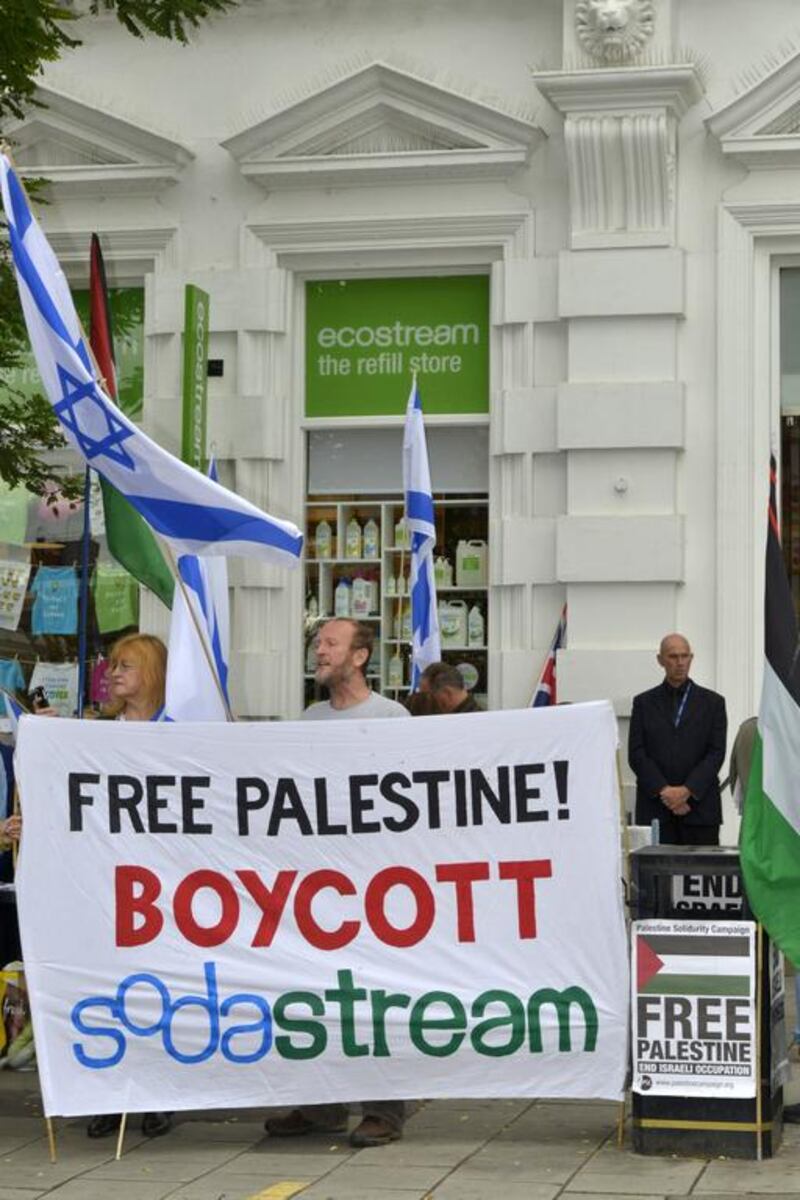BRIGHTON // Steve Bannatyne thought he had left divisive political strife behind when he moved first from Belfast to London and then to the tranquil environs of Brighton, a picturesque middle-class town on the UK’s south coast.
But the 38-year-old Northern Irish shop manager was proved wrong.
A year ago he helped open what he called a “first-of-its-kind” ecological shop that allows customers to refill rather than buy again — anything from coffee to liquid soap, honey to cleaning products — thus taking out the packaging component while locally sourcing as many products as possible.
But almost every Saturday since, activists have picketed the shop, urging passers-by to boycott its products, sparking a counter demonstration and creating a confrontation that often descends into angry shouted exchanges.
The problem: The shop – Ecostream – is part of an Israeli-owned carbonated beverages manufacturer, Sodastream, which runs a factory in Mishor Adumim, an industrial park in the settlement bloc of Maaleh Adumim, the third largest Israeli settlement in occupied Palestinian territory.
Activists for the local Brighton and Hove chapter of the Palestinian Solidarity Campaign (BHPSC) say that Ecostream is part and parcel of a company that profiteers from an illegal military occupation at the expense of internationally recognised Palestinian rights to national independence and statehood on territory captured by Israel in the 1967 war.
Ecological concerns cannot be divorced from ethical business practices, said Russell John, 55, a freelance video editor and long-standing BHPSC member.
“We cannot accept a company, complicit with an illegal occupation, trading in Brighton.”
That is the kind of sentiment members of what has now become the “Sussex Friends of Israel” group will greet with a loud cry of “rubbish” from the other side of the pavement when Mr John conveys it over a megaphone.
Pro-Palestinian activists are completely misguided, said pro-Israeli activist James Dyer, 59, who works in the antiques business.
According to the literature he was handing out, there could not be an occupation of Palestinian land because there never was a Palestinian state.
“It’s disputed territory, not occupied. This shop is perfectly entitled to trade in Brighton,” insisted Mr Dyer, who was wearing a T-shirt bearing a print of Frankenstein’s monster and the inscription “Frankenstein”, a word, he explained, he would shout every time “the other side” called out “Palestine”.
The protests have proven to be a headache to Sodastream.
The company has had to repeatedly justify its West Bank factory in both local and national British media and on Sunday, Sodastream condemned activists who “directed their aggression” at the shop.
“SodaStream ... is a non-political company, with twenty plants around the world. Its factory in the West Bank employs about 550 Palestinians, among a personnel of over 1,000 people, at equal terms and salaries,” the company said.
The activists “are deliberately at odds with our progress in building positive relations between our Israeli and Palestinian colleagues in our West Bank production facility”.
Such justification holds little water with Grace Blindell, a sprightly 92-year-old who spent four years in Gaza in the 1980s and has since sought out local chapters of the Palestinian Solidarity Campaign wherever she has found herself.
“Of course [Sodastream] is employing Palestinians. Israel took their land, water, homes and freedom. What other work have Palestinians got?” she asks.
She was, she said as she handed out leaflets to passersby, committed to shutting down Ecostream.
Sodastream says it remains committed to the Brighton shop where “it’s business as usual”.
Except there is no “usual”. Picketed since it opened, neither corporation nor activists can point to the effect of the demonstration. A baseline for trade was never established.
Last week the shop had done its best week of business since opening, Mr Bannatyne said. But on Saturday, very few customers entered the shop while the protest happened outside. Quite a few people could be seen crossing the street rather then running the gauntlet between the two sets of opposing activists, a total of about 40 people.
One woman noticeably sped up, a frown on her face, as she ignored the demonstration and counter-demonstration.
With extended family in Ashkelon, southern Israel, Gail Adam, 30, a Brighton-area teacher, said the issue “upset” her. Everyone has a right to protest, she said, but for her, it was time to “play down differences, not exacerbate them”.
Others came because of increasing publicity around the protest in recent weeks. “I came with two Palestinian friends because we were curious to see what this was all about,” said Eva Michel, 27, from France, studying music in Brighton, who said she was “instinctively” pro-Palestinian.
Brighton — which elected Britain’s first and only Green Party member of parliament — might have seemed a natural fit for a shop whose main target customer is the eco-conscious.
That was certainly part of the attraction for Mr Bannatyne, who said Northern Ireland made him firmly “non-political”.
“Politics and religion only lead to hatred and strife,” he said.
But Brighton is also the kind of place where political causes are followed with passion.
It is a place where people just might know that the Mishor Adumim industrial park is part of a much broader Israeli construction plan, the E1 project, to build a ring of settlements around Jerusalem to the east, cutting off the city from the West Bank, rendering it practically impossible to locate a future Palestinian capital there and fundamentally undermining chances of a negotiated two-state solution.
And passion brings commitment.
“It took two years to close Ahava,” said Mr John, a reference to the Israeli Dead Sea beauty products manufacturer that opened a shop in central London that closed in 2011 after concerted protests by London’s Boycott and Divestment movement, which advocates a boycott of Israel, like the boycott of South Africa during apartheid rule.
“We’ll stay for as long as it takes”.
okarmi@thenational.ae





